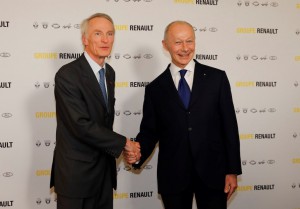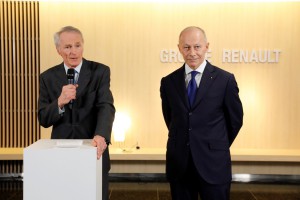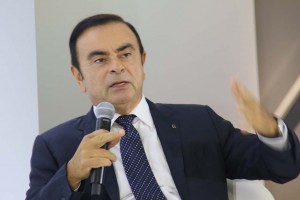Renault has moved ahead and named both a new chairman and a new CEO, replacing Carlos Ghosn who continues to be held in a Tokyo jail on financial corruption charges.
Jean-Dominique Senard will serve as the French automaker’s new chairman, while Thierry Bollore, a long-time lieutenant of Ghosn’s will become its new CEO. The appointments came just hours after Ghosn formally tendered his resignation as Renault’s chief. Renault and its top shareholder, the French government, had, until recently, stood behind Ghosn despite his arrest in Japan, but the latest move reflects the likelihood the 64-year-old executive won’t be released anytime soon.
Ghosn was arrested on Nov. 19, shortly after his corporate jet touched down at Tokyo’s Haneda Airport. He has been accused of multiple crimes, including concealing as much as $88 million in income. But he could stand to earn millions more as a result of his decision to voluntarily resign from Renault, according a Bloomberg report.
Separately, Japanese prosecutors, now taking heat for the way they have handled the case, are defending the decision to retain Ghosn at the Tokyo Detention Center, resisting repeated efforts to have him released on bail.
(Ghosn denied bail, now in third month of detention. Click Here for the story.)
Renault’s decision to split Ghosn’s duties as chairman and CEO was made during an emergency meeting of its board on Thursday. Until this week, both the automaker and the French government had said they wanted to keep Ghosn in his job, government officials tacitly criticizing Japanese prosecutors with reference to “due process.” But, with some observers now warning that the Brazilian-born executive could remain in custody for months – even if he eventually beats the charges against him – it became clear that Renault needed functioning management.
Senard, the company’s new chairman, ran Michelin for nearly seven years. The French tire company and Renault have long ties, Ghosn himself being recruited from Michelin a quarter century ago.
Bellore has been with Renault since 2012 and has been leading a transitional management team overseeing operations since Ghosn’s arrest.
Thursday’s developments mean Ghosn has given up his last formal ties to the Renault-Nissan-Mitsubishi Alliance he effectively created two decades ago. In 1999, he was assigned to oversee a $6 billion Renault bailout of the then-floundering Japanese automaker. As Nissan returned to health, he was appointed its CEO, later adding the same title a Renault. He more recently became chairman of the Japanese carmaker, as well as of Mitsubishi, another troubled Asian automaker the alliance bailed out in 2016.
Ghosn was summarily fired by both Nissan and Mitsubishi shortly after his November arrest. But he agreed to resign from Renault. That decision may have had a clear financial base. By avoiding being fired, Bloomberg reports, he appears eligible for as much as $5.7 million from a do-not-compete clause.
(Click Here for more about Ghosn offering to wear an ankle monitor if released from Tokyo jail.)
Should he beat the charges he is facing in Japan, meanwhile, some observers have speculated Ghosn could go after compensation from both Nissan and Mitsubishi.
The bigger of the two Japanese automakers triggered the scandal when it announced the results of an internal investigation that concluded Ghosn was involved in a variety of financial irregularities. One question raised by observers has been why the automaker decided to pursue criminal prosecution rather than handle it as a civil matter.
As TheDetroitBureau.com previously reported, some speculate the decision reflected Nissan management’s desire to use the case to leverage greater autonomy from Renault. The French company holds a controlling 43.4% stake in its alliance partner and has been exploring the idea of merging the two manufacturers entirely.
Japanese prosecutors have come under criticism, as well, especially after blocking Ghosn’s attempt, earlier this week, to be released on bail after more than two months of being held in solitary confinement in a small cell.
(Ghosn scandal threatens to fracture Renault-Nissan-Mitsubishi Alliance. Click Here for more.)
On Thursday, Shin Kukimoto, the deputy chief prosecutor overseeing the case, told reporters in Tokyo that Ghosn was being held because of fears he might try to tamper with evidence. Kukimoto also said his country did not have the ability to monitor suspects out on bail using the ankle bracelet Ghosn offered to wear to prevent him from fleeing the country.



